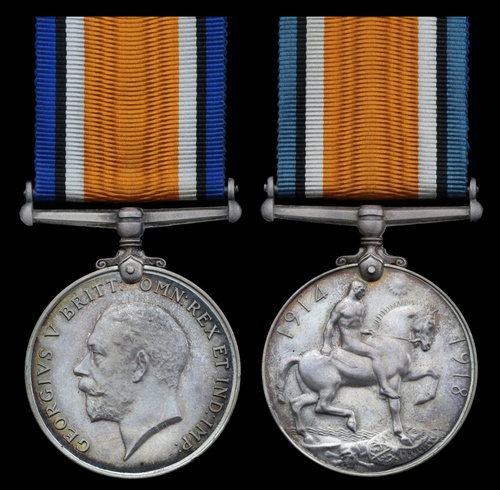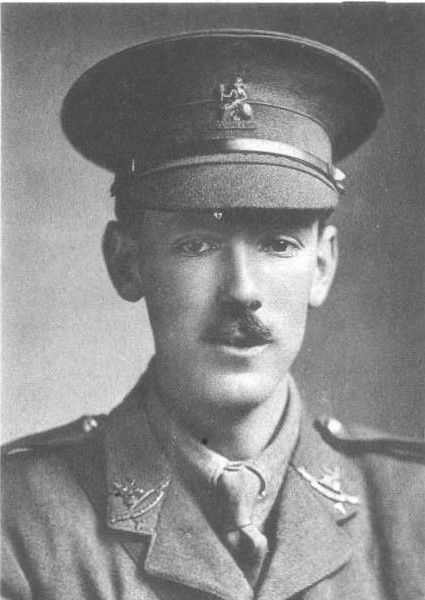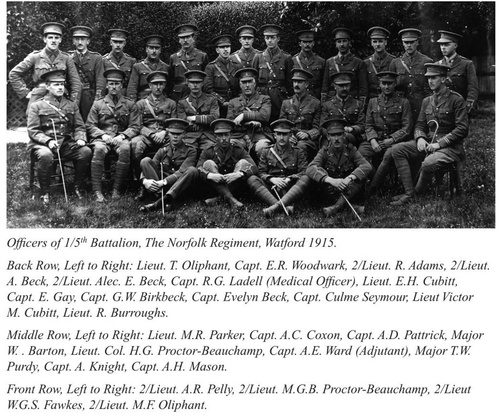Auction: 22103 - Orders, Decorations and Medals VII - e-Auction
Lot: 195
'But the Colonel, with sixteen officers and 250 men, still kept pushing on, driving the enemy before them…Nothing more was ever seen or heard of any of them. They charged into the forest and were lost to sight or sound. Not one of them ever came back.'
The poignant British War Medal awarded to Second Lieutentant M. F. Oliphant, 'C' ('King's') Company, 1/5th Norfolk Regiment, one of approximately 300 officers and men who became the 'Vanished Battalion' during their attack on Anafarta Ova, Gallipoli, 12-13 August 1915
British War Medal 1914-20 (2. Lieut. M. F. Oliphant.), good very fine
Marcus Francis Oliphant was born in 1886 to Francis and Elizabeth, with a brother - Trevor - following in due course. Attending Bengeo School in Hertfordshire, by 1901 he was a boarder at Rugby and went up to Pembroke College Oxford in 1904, obtaining his BA five years later. Upon the outbreak of War Oliphant enlisted in the renowned Artists' Rifles (28th County of London Regiment), but in March 1915 was commissioned into 5th Battalion Norfolk Regiment - an act which was to, sadly, seal his fate not long after.
With barely a few months training, the battalion embarked for Gallipoli and landed at Suvla Bay on 11 August - the situation being difficult, they were rushed up to the front lines almost immediately with no time to settle-in or acclimatise to their new surroundings.
Attack and Confusion
Ordered to advance on Ottoman positions with other battalions of 163rd Brigade, confusion reigned supreme due to lack of clear instructions, maps, and failure by several senior officers to effectively brief their juniors and work in tandem with those units also engaged in the attack - there was even uncertainty as to the exact location of the enemy positions. The 5th Norfolks, on the right flank of the advance, came under increasingly heavy fire almost immediately with the situation rapidly deteriorating as individual company commanders re-aligned their men to wheel right and attack in a different direction. 'C' Company, commanded by Captain Frank Beck, was initially in support but in the confusion moved up to intermingle with Major Purdy's 'D' Company. It was at this time that Marcus's younger brother, Trevor (also a subaltern in 'C' Company) was wounded - his life was then saved by Lance-Corporal Beales, who won the Distinguished Conduct Medal (London Gazette, 22 January 1916, refers) for rescuing his officer under heavy fire. Beales, too, survived and was interviewed in later life about that moment:
"The other was as we were nearing the positions of the Turks, we advanced, they was firing, we actually arrived at a place where we could see the Turks and that was before my officer fell down. He was going over this ridge, he fell down wounded and we was told not to look after anybody but I rushed to his side and I took my field dressing and his field dressing out of our tubes and I put one on here and one on the back, he had a wound this low and he said to me, ‘Never mind me Tom’ he called me by my Christian name, he say, ‘You take this platoon over’ what remained and he said ‘Never mind about me’ so with that, I could have stopped with him I think, I could have gained a VC as you might say couldn’t they, if I’d rescued him but I had to do as he told me. I went on and until I was, found ourselves through the Turkish lines, behind the Turkish lines." (https://stevesmith1944.wordpress.com/2015/07/12/part-3-the-15th-norfolk-regiment-at-gallipoli/, refers).
Chaos and the End of the Line
Whilst the final moments of most men of the 5th Norfolks will never be known for certain, it appears that the battalion disintegrated into pockets who went forward and met various grisly fates: the Commanding Officer (Lt.-Col. Proctor-Beauchamp) and a significant number of his men were ambushed in a sunken road and killed by well-sited machine-guns; another element made it through a vineyard and a group of cottages, only to be surrounded by the enemy and fought to the last man - though there is subsequent controversy that many human remains, bearing Norfolk Regiment badges, were found after the war with a single bullet-shaped hole to the back of the head.
Like so many of his comrades, the body of 2/Lt. Marcus Oliphant was never found and he is commemorated on the Helles Memorial at Gallipoli; his father claimed his medals in 1921. It is also worth mention that this military disaster has given rise to a number of books on the subject - and even a 1999 television drama, starring Sir David Jason and Dame Maggie Smith, entitled "All the King's Men" which specifically covers 'C' Company's fate at Gallipoli. A tribute, in more modern times, to the sacrifice of men such as Marcus Francis Oliphant.
Subject to 20% VAT on Buyer’s Premium. For more information please view Terms and Conditions for Buyers.
Sold for
£190
Starting price
£110









